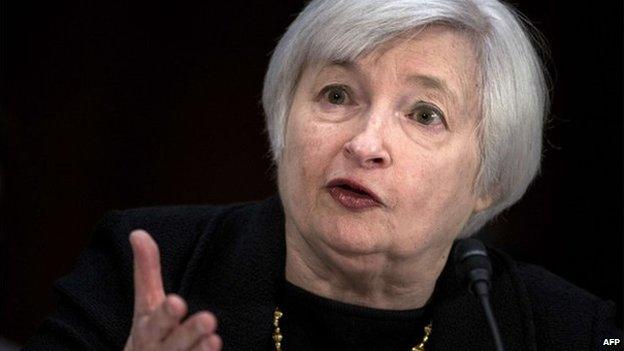The Yellen era
- Published
- comments

As the first woman in charge at the Federal Reserve, the Janet Yellen era will look radically different. But, glimpsing beneath the surface, the Yellen era won't be too dissimilar to her predecessor at least initially, Chairman Ben Bernanke, who steps down on Friday.
Yellen was his deputy after all. And she is importantly one of the architects of the new "forward guidance" policy.
Bernanke may have launched and set the pace for the "tapering" of cash injections by cutting it back before the end of his term. But it will be forward guidance that determines whether the Fed will have been successful in supporting the US economy back to health.
Taper means the end of stimulus (the Fed will cease injecting cash into the economy in due course) but it's not the tightening of monetary policy.
In other words, the Fed isn't withdrawing its support of the economy since it has pledged to keep rates low until the recovery takes hold. But that pledge of support depends on maintaining a separation of sorts between the end of cheap cash injections and the Fed's base rate set at zero to 0.25%, which I have written about before.
To convince markets of it - after all, they're the ones that set our borrowing costs, Yellen and other central bankers use unemployment as the main indicator of a threshold in their forward guidance policy, which is relatively easy to follow and not subject to a lot of revision.
Of course, it's a proxy that fits the Fed's dual mandate to target price stability as well as unemployment.
Risk of derailing recovery
So, despite unemployment being a lagging indicator - it tells you what happened in the economy several months ago that caused firms to hire and fire - it gives a sense as to where the Fed is trying to get the economy to before it considers raising rates.
Once unemployment hits 6.5%, which is still considerably above the 5% that was the long-term figure before the financial crisis, then rates and monetary policy could begin to normalise.
The challenge for Yellen is to make this policy credible. Borrowing costs as seen in the yield on 10-year Treasuries is now closer to 3% versus less than 2% a year ago, which is still historically low. Markets will price inflation into a recovery, so it isn't too surprising. But if rates go up too quickly, then the fragile recovery could be derailed.
Inflation-targeting was a policy that seemed for a long while to manage inflation expectations in the medium term. The Fed could then ride out short-term fluctuations so long as markets believed that the central bank would manage prices over a two-year horizon.
Well, prices weren't much of an issue with the deflationary pressures after a debt crisis in the US. But there were some well-noted problems in the UK when inflation stayed above target for pretty much the past five years despite the housing bust.
Eye across the pond
In terms of forward guidance, the Fed will hope for the same credibility. And this is the challenge for Yellen.
To help manage expectations, the Fed also started to publish individual forecasts of members of the FOMC. There are published dates as to when Fed governors expect the first rate rises. These currently suggest low rates throughout next year.
No other central bank has done forward guidance so far except the Bank of England. But the BoE adopted forward guidance without the accompanying rate projections and a higher unemployment trigger of 7%.
Since UK unemployment has dropped unexpectedly soon to 7.1%, the BoE is trying to counter expectations of rate rises.
For the Yellen era, what happens across the pond could be worth watching at the start of her term. The US unemployment rate is now also rather close to the 6.5% threshold set by the Fed, coming in at 6.7% in December.
During Yellen's tenure, if she can manage to keep borrowing costs low for households and businesses until the recovery takes hold, then that will mark a key success.
Rates stayed low for about two decades after the last systemic financial crash and the Great Depression. As Yellen is taking the helm five years into this financial crisis, it may be some time yet before a judgement can be made on her chairwomanship.